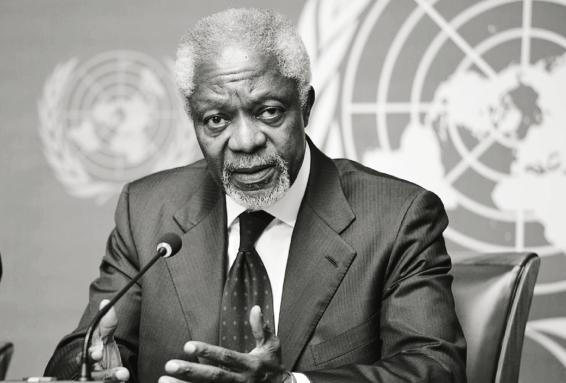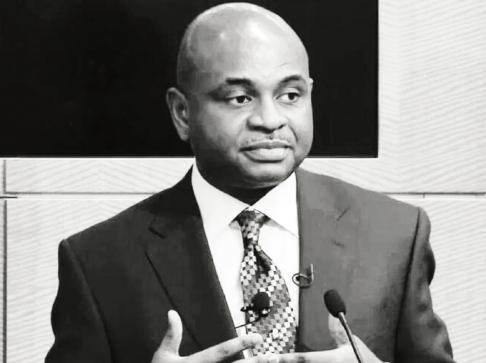回忆安南
2018-01-05ByKingsleyMoghalu
By Kingsley Moghalu


聯合国第七任秘书长科菲·安南8月18日与世长辞,享年80岁。他是公认的联合国历史上最富有改革精神的秘书长,就任后为了和平使命,在世界各地不断地穿梭访问、调停斡旋、化解危机、防止战争、呼吁和谈、谴责暴力,足迹遍布五大洲。无论是在伊拉克危机、中东巴以冲突中,还是在克什米尔争端、阿富汗战争里,都可以见到安南的身影,因此他被誉为“世界上最忙碌的和平使者”。
T o live is to choose. But to choose well, you must know who you are and what you stand for, where you want to go and why you want to go there.
—Kofi A. Annan
The quotation above reflects my worldview. But these are not my words. They belong to someone much older and wiser, and whose mentorship1 and friendship has taught me many lessons in life. I salute Kofi Annan of Ghana, the seventh Secretary-General of the United Nations and my boss of many years, Nobel Laureate and renowned global elder statesman.2
On a recent visit to Mr. Annan at his Foundations offices in Geneva, Switzerland, I was pleasantly surprised to see him just as spritely3, well-kept and un-aged as I had last seen him several years ago. In 2009 I had met him at his office in Geneva to let him know I had decided to resign from my UN system career and was going into the private sector as the founder of a global strategy and risk management consulting firm. As someone who always had the courage to launch out in new, versatile directions during his 35-year UN career before he became Secretary-General, he was very encouraging of my decision to seek new horizons.4 Later that year, he telephoned to congratulate me on my appointment as Deputy Governor5 of the Central Bank of Nigeria.
So, here we were again in Geneva a few months ago as I briefed6 him on my decision to offer myself to serve my country as its President if elected in 2019. He was clearly pleased with my decision, believing as he does that Africa needs a new, vibrant7 generation of leaders. As I left him after an hour of rejuvenating one-on-one discussion in which, as usual, he shared several wisdoms that left me shaking my head in awe, we took photographs.8 We shook hands as the camera clicked. “Ah, politician”, he intoned9 to general laughter from all present.
Kofi Atta Annan did not begin his illustrious UN career on the political or diplomatic side of the ledger.10 Rather, he was a competent manager of human and financial resources. After graduating from Macalester College in Minnesota, USA and post-graduate studies at the Graduate Institute for International Studies in Geneva in the early 1960s, Annan joined the World Health Organization in Geneva, at the lowest professional entry level of “P-1” and later transferred to the United Nations Economic Commission for Africa.11 He later returned to school as a mid-career student at the Sloan School of Management at the renowned Massachusetts Institute of Technology (MIT)12, where he obtained a Master of Science degree in Management in 1972.
He subsequently served in the UN peacekeeping mission that supervised the truce between Israel and the Arab States in the Middle East, as a senior manager in the UN Joint Staff Pension Fund in New York, and as Chief of Personnel at the Office of the UN High Commissioner for Refugees in Geneva.13 In the mid-1980s he became Director of Personnel at UN Headquarters in New York and, in 1990, Annan was appointed Assistant Secretary-General and the United Nations Controller with responsibility for the budget and fiscal management of the world body.14
Kofi Annans political career really took off when UN Secretary-General Boutros Boutros-Ghali made him Assistant Secretary-General in the peacekeeping department and later promoted him to Under-Secretary-General and head of UN peacekeeping.15 This was historic because that important part of the UNs work had hitherto been led exclusively16 by officials of American and British nationality since the organization was founded in 1945. I had joined the UN Secretariat in 1992 and, after serving in the UN Transitional Authority in Cambodia for a year,17 I was appointed a Political Affairs Officer in the peacekeeping department at the New York headquarters in 1993.

With Mr. Annan now my boss, I observed him closely. I learnt from him how to manage cultural, ethnic and racial diversity in the global workplace in addition to my daily political duties. It turned out also that we were neighbors in Roosevelt Island18 in Manhattan. We frequently took the cable car together over the Hudson River into the city and walked to work at the UN most mornings. Unlike most African “big men,” Kofi Annan loved to walk, disliked driving, and to the best of my knowledge did not have a driver. He would tell me stories about his career and advise me on mine as we trekked19 to the office.
In the mid-1990s Egypts Dr. Boutros Boutros-Ghali, the brilliant but pompous Francophile who in 1991 became the first African to be elected Secretary-General of the UN,20 was engaged in a running battle with the United States government. “BBG,” as he was known, was the master of all he surveyed. For this reason, he clashed often with Dr. Madeleine Albright, the U.S. Ambassador to the UN who later became the American Secretary of State.21 Albright was not a woman to be scorned22 without consequence. As Boutros-Ghalis first five-year tenure drew to a close, Washington blocked his re-election by casting a veto against him in the first ballot for the selection of the SecretaryGeneral in the UN Security Council.23 Boutros-Ghali“suspended” his candidacy and the rest is history.24
Most pundits25 and UN staffers did not give Kofi Annan much of a chance of becoming Secretary-General. In their narrow conventional wisdom, they saw him as lacking experience as a “political heavyweight”in the diplomatic world, unlike several African ministers of foreign affairs who had home or regional “constituencies.”26 On the contrary, it was obvious to me long before the end of BoutrosGhalis tenure that Annan would replace him. The reason was simple: Quite apart from the convenience of Annan being a black African (in which case no one could successfully accuse Boutros-Ghalis American traducers of racism), his qualifications matched the mood and needs of the time.27 Management reform was the big issue at the UN in those days and, unlike his competitors from Africa who were all African politicians in the traditional sense of the word, Annans technocracy and management credentials redounded to his advantage in the mind of the Western powers that in reality control the UN.28 I was therefore not surprised when he emerged victorious in the selection process.

Before then, a situation arose in which, despite my deep respect for Annan, I had to make a decisive personal choice. In 1995, as Boutros-Ghalis tenure wound down to a close and rumors swirled that Annan might be in the running for his job, the Egyptian diplomat appointed Annan as his Special Representative for the Former Yugoslavia, which had become known as “the graveyard of diplomats.”29 The assignment lasted four months. Soon after Annans arrival at his base in Zagreb30, Croatia, I received official word that he had directed that I be released from New York to join him there as his Special Assistant. This was the kind of career opportunity any young officer would die for, and colleagues assumed I would jump at the honor. Under “normal temperature and pressure” I certainly would have, but there was an important complication: My wife was heavy with our first child and close to delivery. As a young couple we did not have a house-help in New York. Faced with a choice between strategic career advancement and a critical family obligation, I opted to stay with my spouse in New York and sent word to Annan apologizing but explaining the situation.31 He was most gracious32 and indicated that he had not known the intimate details of my family circumstances and that he understood and respected my decision.
Kofi Annan went on to become perhaps the most successful Secretary-General of the UN in its history. Those who hold that position have always been assessed through the prism of whether they were more “secretary”or “general,” but Annan managed to escape this simplistic categorization.33 Boutros-Ghali was a general. Ban Ki-moon34, the South Korean that succeeded Annan a decade later, was seen as a secretary. Annans personality and his personal technocratic competence were what made him so successful in running the UN. He led far-reaching management reforms in the UN, launched an ultimately successful war against the HIV/AIDS pandemic including the establishment of the social investment fund The Global Fund to Fight AIDS, Tuberculosis and Malaria in Geneva, and launched the Millennium Development Goals.35
It was not all smooth sailing.36 The American invasion of Iraq in 2003 complicated37 his second term in office. His relationship with Washington soured after Annan boldly described the intervention as “illegal” under international law, and the remainder of his tenure was troubled as the Americans undermined his authority and prestige with orchestrated attacks against him.38 Out of office as UN scribe39 Annan, alongside Nelson Mandela, became a leading global statesman and remains so to date. Besides Mandela, its doubtful that any African has projected the black race into the global mind with as much success as Kofi Annan. Thats called a life of consequence.
1. mentorship: 師长的教诲。
2. Nobel Laureate: 诺贝尔奖获得者;renowned: 著名的;statesman: 政治家。
3. spritely: 有精力的,活泼的。
4. 成为秘书长之前,他已经在联合国工作了35年,一直锐意改革、谋求多方面发展,他非常支持我寻求新发展方向的决定。launch out:开始做某事;versatile: 多方面的。
5. Deputy Governor: 副行长。
6. brief: 简要告知,向(某人)介绍情况。
7. vibrant: 有活力的。
8. 我们进行了长达一个小时的充满活力的单独交流,像往常一样,他给了我许多让我不停地摇头惊叹的睿智建议,会谈结束后我们合了影。rejuvenating: 使人恢复精神的。
9. intone: 缓慢庄重地说。
10. illustrious: 杰出的;on the political or diplomatic side of the ledger: 在政治或外交方面。
11. “P-1”: 联合国公务员的等级之一。联合国国际公务员的职位分三个等级,包括高级官员D级(Director,分D-1和D-2两个级别)、业务类官员P级(Professional,分P-1至P-5五个级别)和一般事务类人员G级(General Service,分G1到G7七个级别,主要是秘书、服务和安全人员);United Nations Economic Commission for Africa: 联合国非洲经济委员会,联合国经社理事会下属的区域委员会之一。
12. Massachusetts Institute of Technology (MIT):麻省理工学院。
13. supervise: 指导,监督;truce: 休战;UN Joint Staff Pension Fund: 联合国合办工作人员养恤基金,目的是在工作人员退休、死亡、残疾和有关福利停止时向其提供养恤金;personnel: 人力资源部;Office of the United Nations High Commissioner for Refugees: 联合国难民事务高级专员办事处。
14. UN Headquarters: 联合国总部;Assistant Secretary-General: 助理秘书长;United Nations Controller: 联合国财务主管;fiscal:财务上的。
15. Boutros Boutros-Ghali: 布特羅斯·布特罗斯-加利,第六任联合国秘书长;UnderSecretary-General: 副秘书长。
16. exclusively: 排他地,专有地。
17. UN Secretariat: 联合国秘书处;UN Transitional Authority in Cambodia: 联合国柬埔寨临时权力机构。
18. Roosevelt Island: 罗斯福岛,位于美国纽约市。
19. trek: 远距离行走。
20. pompous: 自大的,浮夸的;Francophile: 亲法者。
21. clash: 冲突;Secretary of State:(美)国务卿。
22. scorn: 轻视,看不起。
23. 当布特罗斯-加利的第一个五年任期即将结束时,美国政府在第一轮投票中否决了他作为联合国安理会秘书长的人选,从而阻止了他的连任。tenure: 任期;veto:否决权;ballot: 投票选举。
24. suspend: 暂停;candidacy: 候选人资格。
25. pundit: 专家,权威。
26. heavyweight: 有影响的人物;constituency:选民,支持者。
27. traducer: 诽谤者;qualification: 资格,条件。
28. 管理改革在当时是联合国的大问题,与那些拥有传统意义上的非洲政治家背景的竞争对手不同的是,安南的专家型的政治素养和管理资历使他在实际上控制了联合国的西方大国看来具有优势。technocracy:技术专家治国论;credentials:(复数)资格,资历;redound: 促进,有利于。
29. 1995年,当布特罗斯-加利的任期接近尾声,且有传言说安南可能在竞选他的职位时,这位埃及外交官任命安南为被称为“外交官的墓地”的南斯拉夫的特别代表。wind down: 接近尾声,即将结束;swirl:(使)打旋,起漩涡。
30. Zagreb: 萨格勒布,现克罗地亚(Croatia)首都。
31. 面对关键的职业发展和重要的家庭责任之间的选择,我选择和我的妻子一起留在纽约,并向安南致歉,解释了这一情况。
32. gracious: 亲切的,和蔼的。
33. prism: 棱镜,through the prism of指从……的角度来看;simplistic: 过分简单化的。
34. Ban Ki-moon: 潘基文,第八任联合国秘书长。
35. pandemic:(全国或全球性)流行病;The Global Fund to Fight AIDS, Tuberculosis and Malaria: 抗击艾滋病、结核病和疟疾全球基金,是一个政府与民间合作创办的国际金融机构,总部设在瑞士日内瓦;Millennium Development Goals: 联合国千年发展目标,是一项旨在将全球贫困水平在2015年之前降低一半(以1990年的水平为标准)的行动计划。
36. 这并不都是一帆风顺的。
37. complicate: v. 使……复杂。
38. 在安南大胆地说这一干涉根据国际法是“非法的”之后,他与美国的关系就恶化了。他余下的任期也受到了困扰,因为美国精心策划了对他的攻击,削弱了他的权力和威望。sour:(使)变坏,恶化;orchestrate: v.精心安排,密谋。
39. scribe: 文员。
